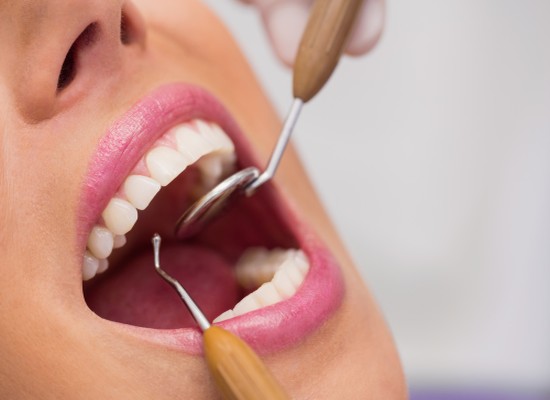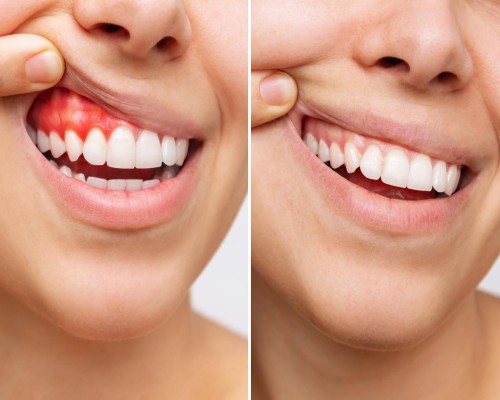Gum Disease Treatment Turkey,Gingivitis,Gum Infection In Antalya Turkey
What is Periodontology?

Periodontology, in addition to dealing with gum health, is the branch of dentistry that deals with the treatment of teeth and gums, Gum Diseases, and diseases in the bone tissues that support the teeth. Specialist dentists serving in this field are also called periodontists.
Periodontology's first goal is to recover damaged and seemingly impossible teeth. At the same time, there is a need for Periodontology and periodontists to protect the general health of the patient. For example, the immune system of a patient with a chronic gum infection is at risk. Due to gingival recession, periodontal treatments are applied to the smile line of the individual whose ideal shape is distorted, and a smile design is made for the individual.
What is Gum Disease?
It is an inflammation of the gums that extends to the bone that supports the teeth.
Generally speaking, infection of the tissues in the tooth due to microbial dental plaque is called Gum Disease. It is a condition that affects people of all ages.. Every individual with gingivitis should care about this condition and have it treated. In this mostly painless disease, first of all, bad breath and bleeding in the teeth are seen. If this condition is not diagnosed and treated by specialist physicians, the teeth begin to dislodge after a short time, and the teeth fall out as the tissue surrounding the teeth is destroyed.
Ignoring bleeding and redness of the gums In individuals who do not pay due attention to oral and dental health, the disease is noticed when it reaches the level of periodontitis. Unfortunately, this often results in the patient losing their teeth. Because teeth damaged by such a progressive disease are usually irreversible.
The treatment of gum diseases (Periodontology) such as gum recession, gum swelling and inflammation is successfully applied in Dent Plaza Group Dental Clinic, one of the best clinics in Antalya. Our patients who want to have gum diseases - periodontal treatment (Periodontology) in Antalya can contact for an appointment.
What are the symptoms of Gum Disease?
• Swelling of the gums,
• Gingivitis,
• Gum bleeding,
• Gingival bleeding during daily dental care or bleeding gums out of nowhere,
• Change in tooth alignment when the mouth is closed,
• Transformation of the natural color of the gums, which is pink, to red and purple,
• Gums that do not fully cover the tooth,
• Pain felt at the time of chewing,
• Beginning to open between the teeth,
• Teeth appear longer than normal as a result of the gingival recession;
• Gum abscess
• Enlargement of the gingiva,
• Having a constant bad taste and unpleasant breath in the mouth,
• Increasing tooth sensitivity,
• When plaque begins to dislodge in the teeth, it is a sign of Gum Disease.
What are the types and stages of Periodontal Disease?
It is determined which of the fiber tissues between the gum, jawbone, tooth, and jaw is infected when determining the types of Periodontal Disease. This stage is important because treatment is started according to this determination. The size of periodontal abscesses can vary between 20 mm and 80 mm.
Types of Gingival Abscess and Periodontal Abscess dental abscess
Types of gum abscesses:
• periapical inflammation: It is a type of gingivitis that occurs at the tip of the root of the tooth.
• Periodontal abscess: bacteria and plaque tissue in the gum line spread rapidly in the periodontal pocket, forming this type of inflamed tooth abscess.
• Gingival inflammation: It is a type of gingivitis that occurs directly in the gum surrounding the tooth.
Gingivitis
Gingivitis is the first stage of Gum Disease. In gingivitis, the gums are red, gingival swelling occurs, bad breath is noticed, and occasional bleeding may occur.
The plaque tissue that occurs on the surface of the teeth due to reasons such as not brushing the teeth at the right time and in the right way and not using dental floss causes this disease. When the necessary oral and dental health care is not done, oral and dental hygiene cannot be provided. For this reason, toxins begin to accumulate in the mouth and teeth. These toxins cause gum irritation and gingivitis over time. In gingivitis, bleeding occurs when brushing and flossing the teeth.
Since gingivitis is the first stage of Gum Disease, the dental bone and tooth-related tissues are unaffected. Therefore, the progression of the disease can be stopped. If it is diagnosed early and the necessary precautions are taken, the teeth and gums can regain the health they should have. The patient can be saved from the bad consequences of tooth loss.
If gingivitis treatment is neglected, the disease progresses, and periodontitis develops.
Periodontitis What is gingival recession?
Periodontal (Gum Disease) disease causes the gums surrounding the teeth to be pulled from the tooth surface, causing teeth or tooth roots to emerge. When this gingival recession progresses, it causes pockets to form on the tooth surface over time. Food waste and plaque quickly accumulate in these pockets, and these accumulating food wastes and plaques pave the way for the rapid progression of the disease.
In the later stages of gingival recession, the soft tissue surrounding the tooth and the bone tissue supporting the tooth begin to be damaged; over time, the patient's bone tissue is destroyed, and the patient may lose their teeth. Gum recession is a very common infection. In the early stages of periodontitis, a pocket-holding of the plaque is seen just below the gum line. At this stage, our specialist periodontist begins treatment for the patient with periodontitis in our clinic. Our doctor explains in detail how to take care of the patient at home to protect their oral and dental health. Our expert periodontist gives our patients the right brushing training. In this way, the progression of the disease and damage to the bones and fibers holding the teeth can be prevented.
Advanced periodontitis; It is the stage in which gingivitis damages the patient's jawbone and periodontal fibers at a level that has become impossible to treat. This means that the disease is now in its final stage. Although there is a possibility of saving teeth with intensive treatments, unfortunately, these damaged teeth cannot be saved if the disease has progressed. Teeth that are damaged due to gingival recession are displaced and fall out or have to be extracted.
Periodontal pockets occur between the teeth and gums in late-detected periodontitis. The disease progresses rapidly due to the bacteria that settle in these pockets. The rapidly spreading infection is also painful. Since the late-detected disease damages the tissues that support the teeth, the teeth lose their strength, wobble, and fall out. Even if these teeth do not fall out on their own, they force the patient to have them removed because they lose their function in eating. These teeth that loosen and lose their biting and chewing functions are extracted even if the periodontist does not decay them.
What causes Gum Disease?

- By failing to place sufficient emphasis on oral and dental health,
- Bacterial plaque forms on the teeth due to teeth that are not brushed regularly and correctly,
- Not using dental floss,
- Excessive alcohol consumption, smoking, or drug use,
- Vitamin C deficiency,
- Inadequate or unhealthy nutrition,
- Frequent consumption of harmful foods,
- Wrong eating habits,
- Pregnancy, menopause, hormonal changes,
- Genetic predisposition,
- Obesity,
- Leukemia, HIV / AIDS, rheumatoid arthritis, diabetes,
- Cancer treatments,
- Heart and blood pressure drugs, antidepressants, and side effects of some drugs cause Gum Disease.
What to do after a Gum Disease treatment?
- Our specialist periodontist should tell the patient how to take the medicine he or she has been given.
- In order to protect oral and dental health, the patient should brush their teeth correctly and effectively for 2 minutes at least twice a day.
- Dental floss should be used correctly once a day.
- Anti-bacterial mouthwashes should be used for oral hygiene.
- Dentists should be examined for dental check-ups twice a year.
- Smoking and alcohol habits should be stopped.
- Attention should be paid to proper and healthy nutrition.
- Care should be taken not to consume products that may harm oral and dental health.
How much does gum disease treatment cost in Antalya, Turkey?
Gum disease treatment prices vary from patient to patient. Our expert dentist can give you a specific cost following a comprehensive examination. You can contact us for a preliminary examination and for detailed information about gum disease treatments prices in Antalya, Turkey.
Does laser treatment for gum disease work?
Traditional and modern methods are used to treat gum diseases. Some of the traditional methods are scaling and root planning. Laser treatment is a revolutionary modern treatment option for treating periodontal disease.
Research has proven that laser therapy has similar success rates to traditional treatment methods in treating gum disease.
Advantages of laser treatment:
- Less bleeding
- Fast recovery
- Reduce the risk of bacterial reproduction
- Maintaining natural and healthy tooth structure
Frequently Asked Questions
If Gum Diseases are ignored and not treated early, they trigger heart, stomach, diabetes, and circulatory system diseases and weaken the immune system. In pregnant women, it can cause different diseases.
Vitamin C deficiency can cause Gum Disease.
After the treatment, the gingiva heals in a period of 1 week at the earliest and 2 weeks at the latest.
First of all, the area with a gingival abscess should be examined by the periodontist. Gingivitis will go away in one week if antibiotics that our periodontist says are good for it are used correctly.
